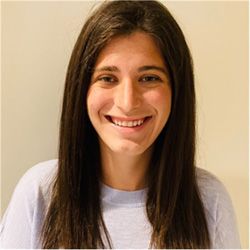What do you get when you combine a love of psychology with a keen interest in medicine? Clinical social worker Jessica Gelfarb knows that answer well. With one foot in both worlds, she helps GW Cancer Center patients navigate their most challenging life journeys. While she guides them through the non-medical logistics of their disease, they show her how it’s done with grace and dignity.

What’s your story?
I’m a DMV native — I grew up in Bethesda. Even though I went away for college and graduate school, I knew I would come back to the DC area. What I didn’t know was that I would return as a social worker.
I studied psychology as an undergrad, thinking I would pursue a career as a clinical psychologist. After working in different labs and conversing with professionals in the field, I decided social work was the best fit for me because it focuses on client interaction and being their source of support.
I’ve always been interested in medicine. During one of my internships, I worked in a hospital cardiology unit and had the opportunity to shadow other departments. I fell in love with the multidisciplinary and collaborative aspect of the job. I worked for a number of years with transplant patients at Georgetown, which was a great experience. I then transitioned to working in oncology at GW Cancer Center, which has been fascinating and extremely rewarding. Here at the GW Cancer Center, I help patients and their families with issues like financial concerns or housing or food insecurity after receiving a cancer diagnosis. I provide mental health and emotional support, helping them process their emotions and hone their coping skills — this is such an important component of our work. One of my favorite parts of the job is facilitating different patient support groups with my colleagues. This has been and continues to be, an incredible and rewarding experience.
What gets you out of bed in the morning?
Definitely the patients. I am in awe of how they deal with such challenging circumstances, which are not just health issues. They have the major life stressor of cancer coupled with psychosocial and financial issues, and a lot of our patients are taking care of other people while going through treatment.
I value these relationships, some of which have been built over several years because that’s how long they’ve been in treatment. I also get to know their families. I want to show up for them, to be there for them, and make sure they feel supported, even if it’s just listening. They inspire me every day.
Working in oncology can understandably be challenging at times. I’m on a great team — we support each other and help each other process difficult situations. Having them here makes all the difference.
What is that one book that has influenced you the most?
I read Ordinary Magic by Anne Masten for a developmental psychology class. She’s researched resiliency and what leads people to be resilient when faced with unimaginably difficult circumstances. This book focuses on children, but the lessons can be widely applied. What struck me most was the idea that resiliency isn’t a unique or rare phenomenon. Human beings are resilient by nature, and there are factors like having a strong sense of self, feeling well supported by your community, and, for children, especially, having at least one strong parental or mentor relationship that foster resiliency.
I always go back to these ideas when I’m helping someone tap into that resiliency, especially when they don’t think they have anything left.
You and your work have made a difference for so many patients. Is there a patient who has made a difference for you?
So many of them, really. But one patient, in particular, made an impact — a really big impact. She was a younger patient, right around my age, who had metastatic cancer. She and her family really touched me. They rallied around her, and their attitudes were incredible throughout the experience. She was more focused on living her best life instead of dwelling on the seriousness of her condition. After she passed away, her oncologist said that her focus was never on dying; it was on living her life to the fullest. She was committed to that and the whole team found it so inspiring. We’ll have that forever.
What is the most interesting thing we should know about you?
As I mentioned, I grew up in the DC area. I was lucky enough that many of my extended family—cousins and grandparents—lived within a five-minute drive from our house. I had a very close relationship with my grandma, who was a huge part of my childhood. She hosted many family events at her home, and we would all go on these great big family vacations.
When I was in elementary school, we would go on Starbucks dates. We’d just sit together and talk about anything; about everything. She had a big, big influence on me and definitely impacted my career decisions. Sadly, she’s not here anymore, but I know she’d be proud of the work I am doing.



